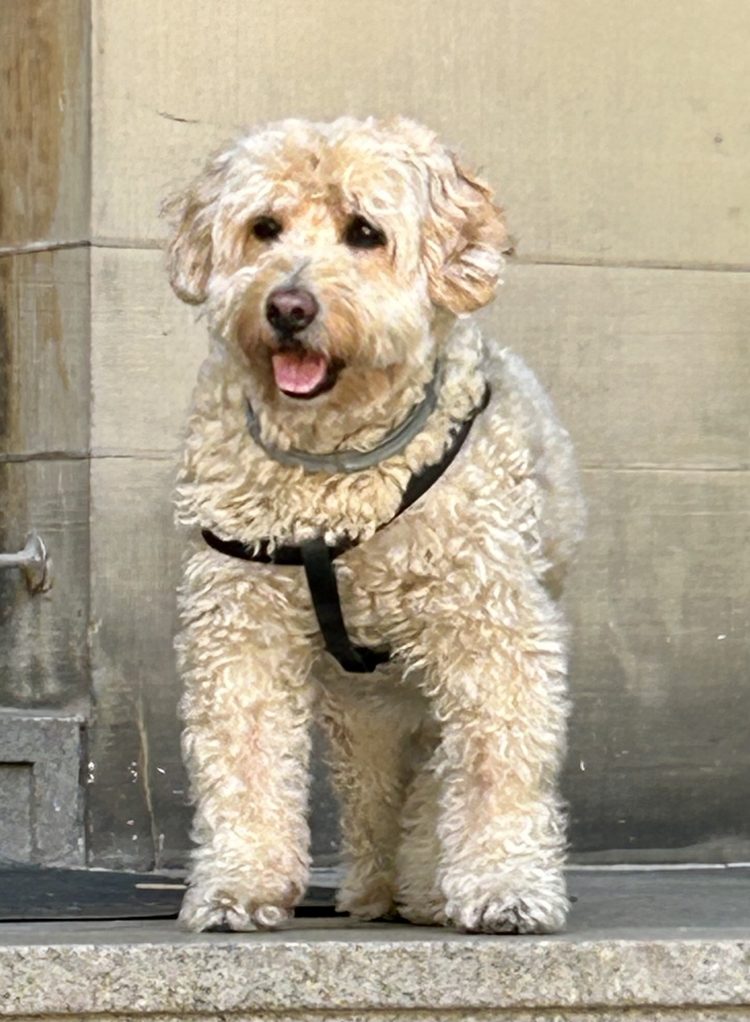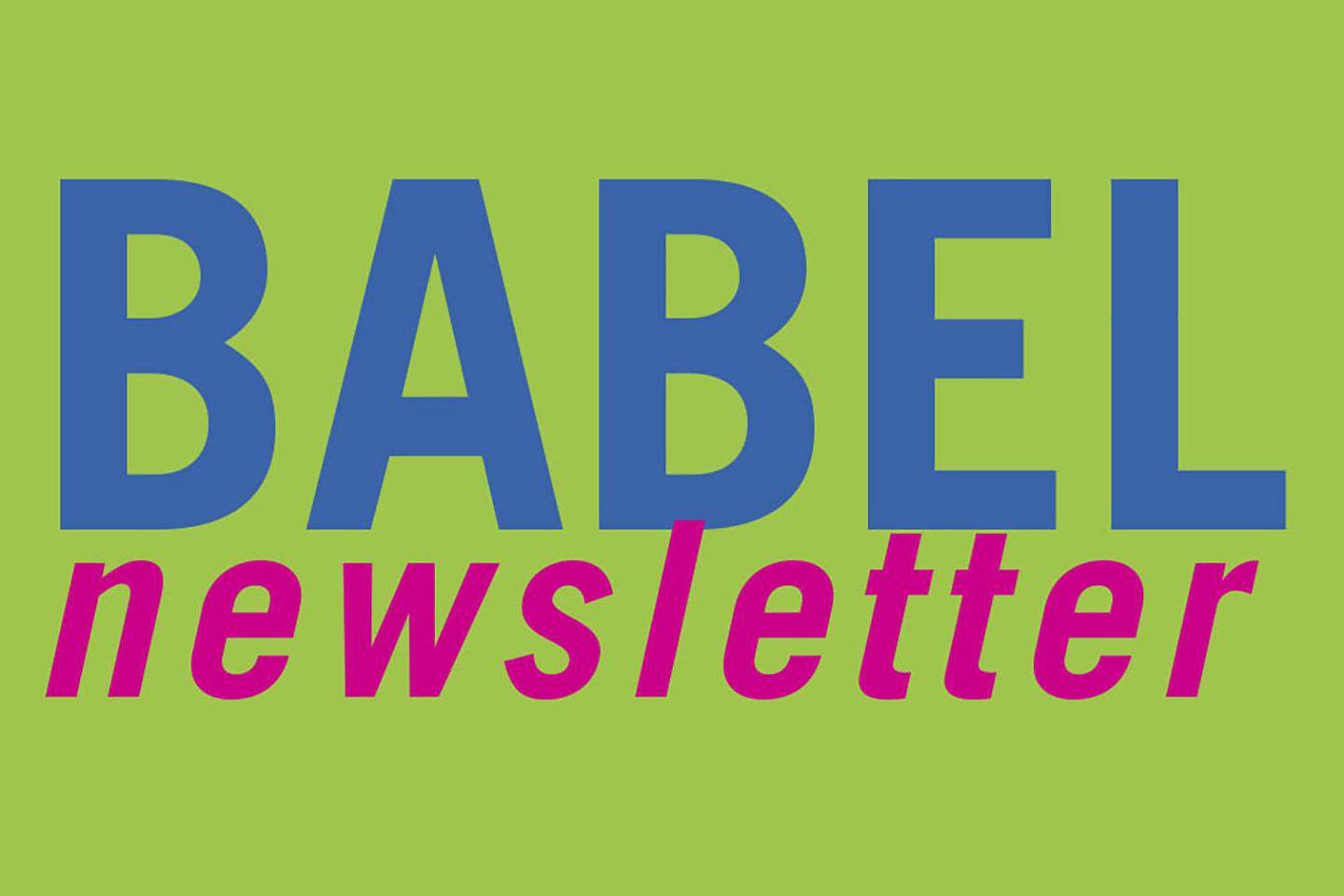
Events
- During IAP, Emily taught a three-session fiber arts workshop at the MIT Museum as part of Project Manus, where twelve students from various disciplines across MIT explored the basics of felting with wool. In the first two sessions, they experimented with surface design techniques like 3-D shapes, resists, fringe, geometric forms, folds, and layers. For the final session, students applied these skills to a project of their choice—whether a vessel, wearable, tapestry, or another creative form. No prior felting or fiber arts experience was required, but participants committed to all three sessions. It was an incredible opportunity to share her love of fiber arts with the MIT community, and she loved seeing students from different fields engage with this hands-on craft!
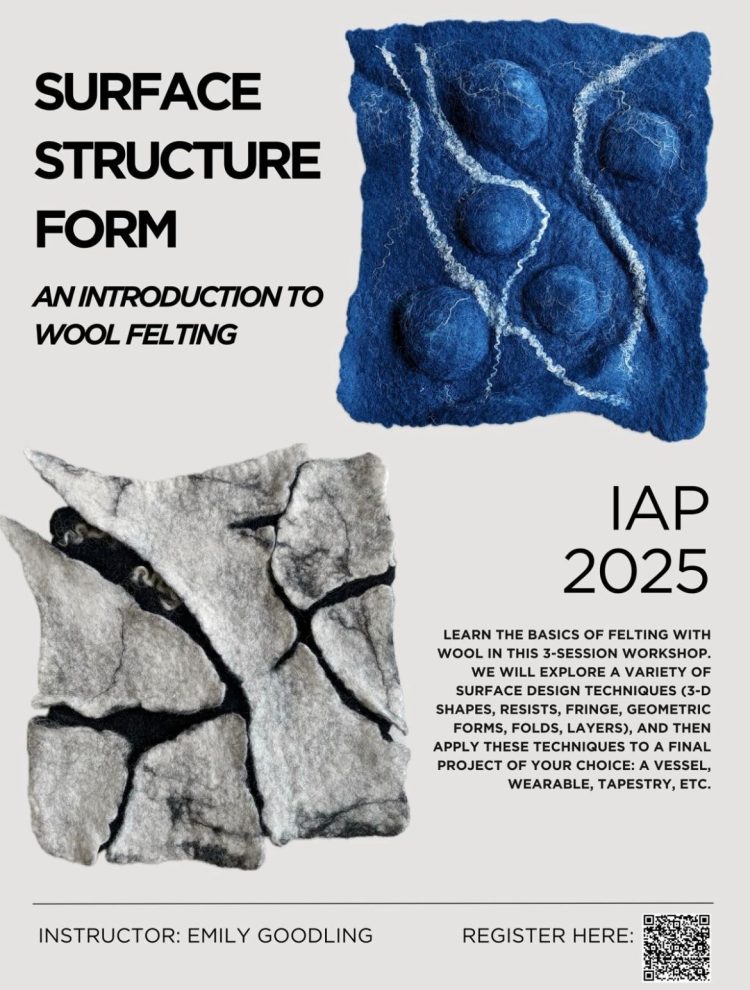
Fiber arts workshop poster
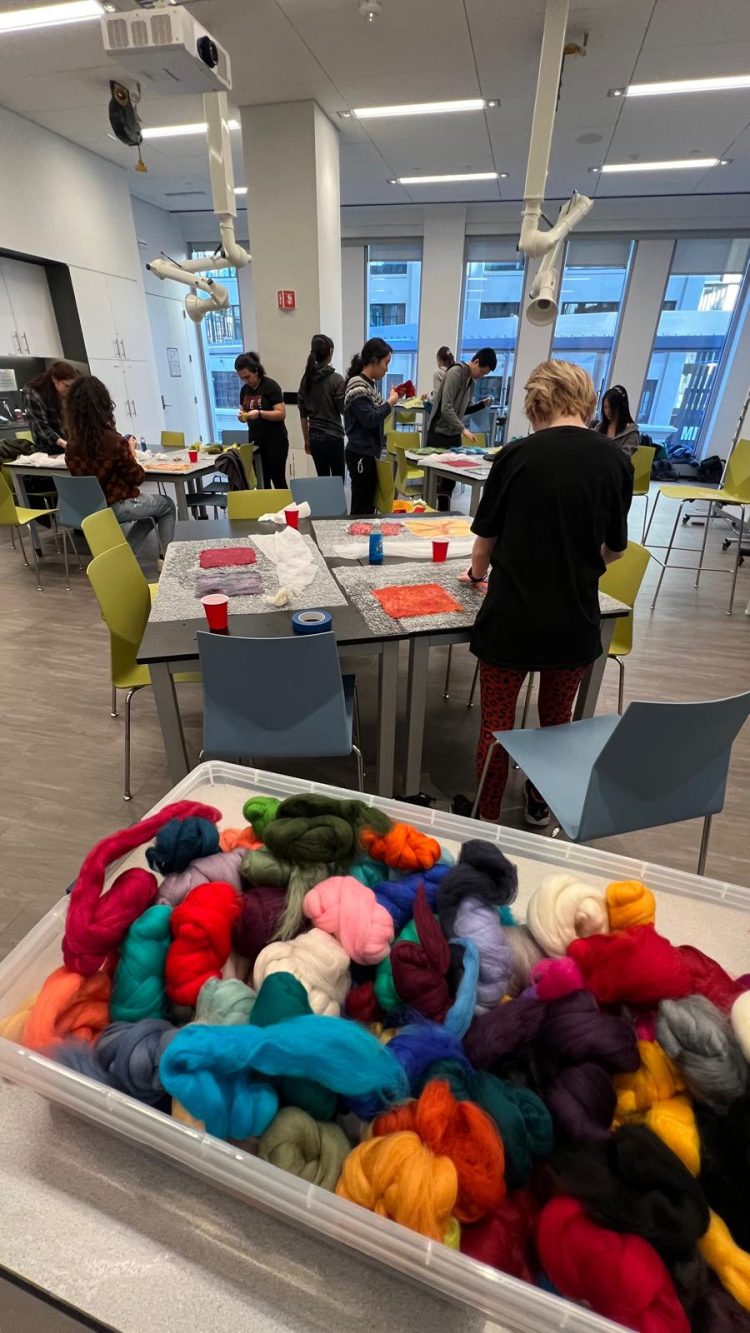
Fiber arts workshop
- Emily Goodling continued to organize the German table Stammtisch, where students can attend and speak German in an informal setting, eat pizza, and listen to music. The events have attracted students from all German classes taught at MIT and beyond, with an average of 17 students attending each meet-up this semester!
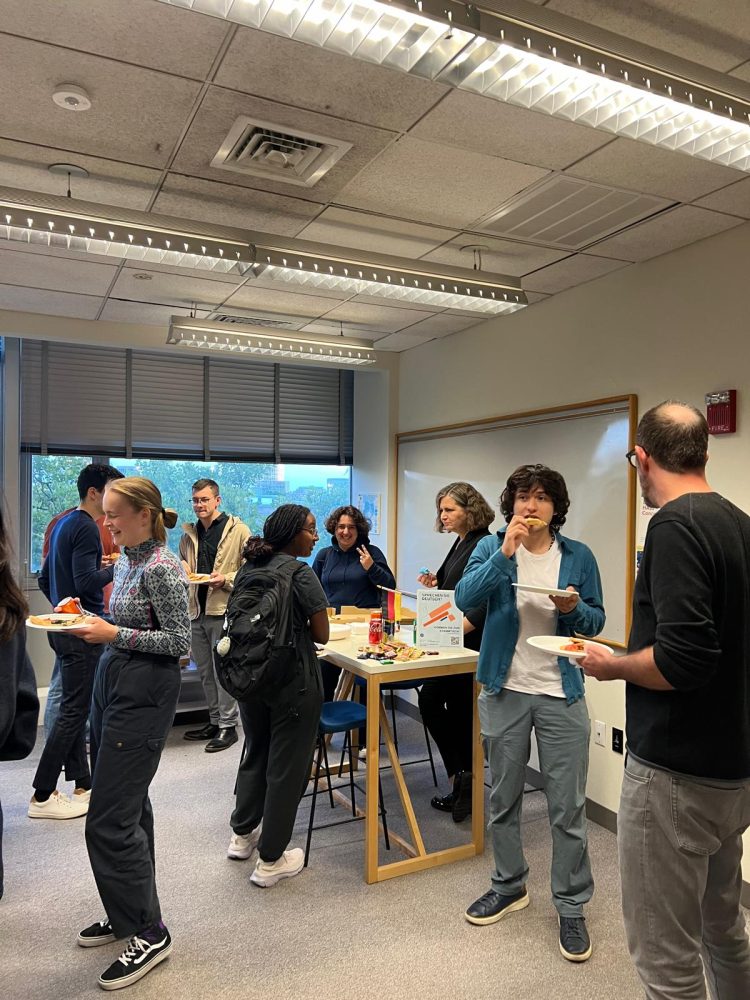
German table Stammtisch
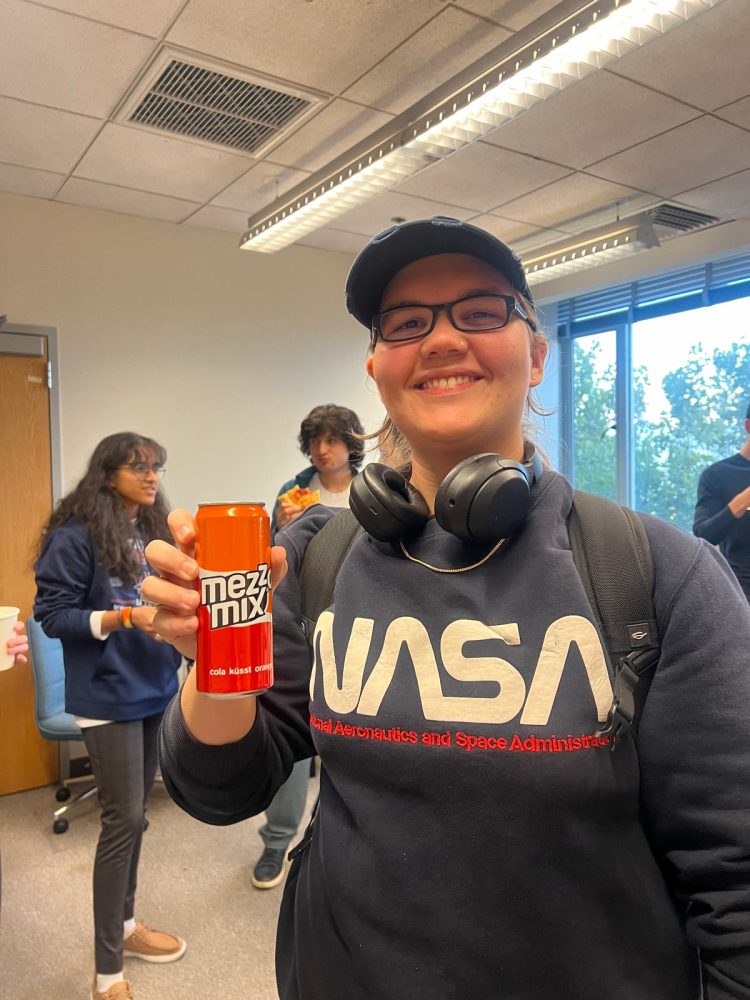
German table Stammtisch
- Mark Römisch and Emily took students to a performance with KRAFTWERK, an iconic German electronic/techno group from the 1970s, with tickets generously purchased through a CAMIT grant.
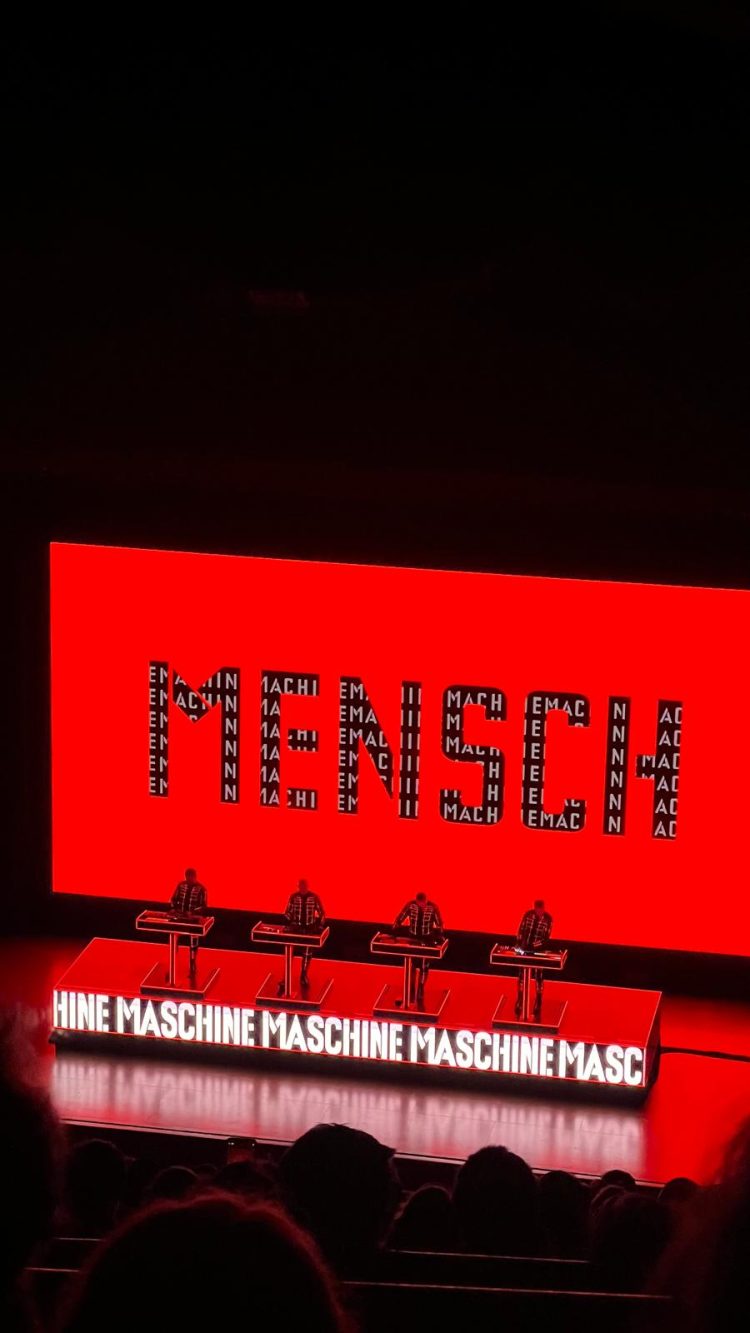
KRAFTWERK band
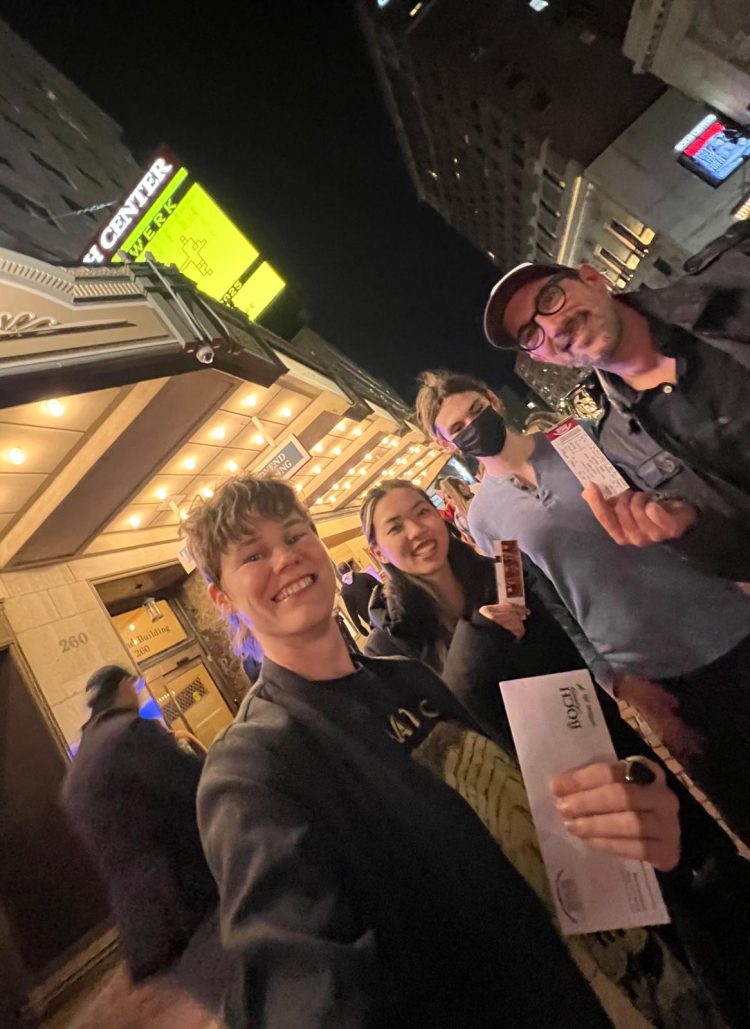
Emily Goodling (Left), Mark Römisch (right) and two students (middle)
- On February 18, 2025, Wakana Maekawa and Masami Ikeda organized a collaborative Japanese calligraphy event for students enrolled in Hybrid Japanese II (21G.S52) and IV (21G.S54). The event offered students an opportunity to experience the art of shodō (Japanese calligraphy) and deepen their cultural appreciation through hands-on practice. Read more.
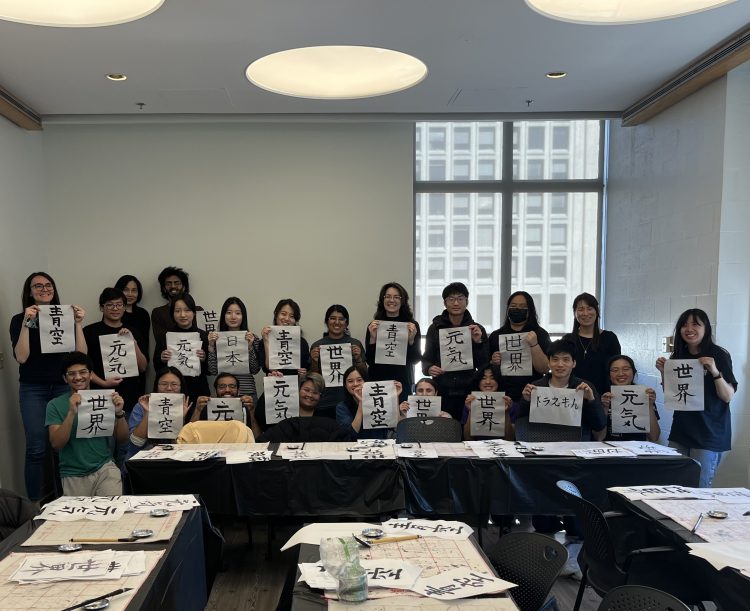
Wakana Maekawa(back row first on the right), Masami Ikeda (Left on the backrow agaist the wall) and their students
-
On April 4, 2025, Arabic Language Lecturer Muna Bruce, Spanish Language Lecturer Javier Barroso, and Music and Theater Arts Lecturer Garo Williams collaborated on Melodious Ties: The Legacy of Al-Andalus, a cross-cultural event at Killian Hall co-hosted by Global Languages and Music & Theater Arts. The evening featured live music, poetry, and food, celebrating the historical and artistic connections between the Arabic and Hispanic worlds. Spanish students, guided by Barroso, presented work in Spanish on themes from the Al-Andalus era, while Arabic students performed selected poems in Arabic, exploring their cultural significance. In collaboration with Music & Theater Arts students, they offered bilingual poetry recitations and musical pieces that blended flamenco guitar and Arabic muwashshah. The event highlighted shared linguistic and artistic heritage, engaging students in meaningful performance and scholarship, and was attended by faculty and community members.
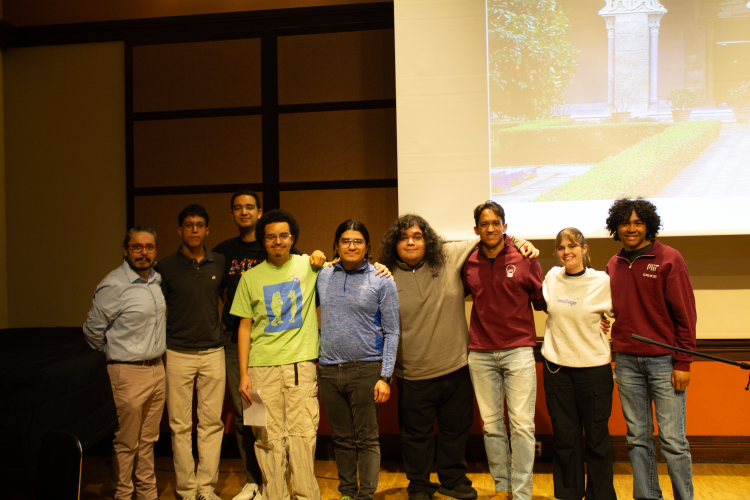
Spanish Language Lecturer Javier Barroso with his students
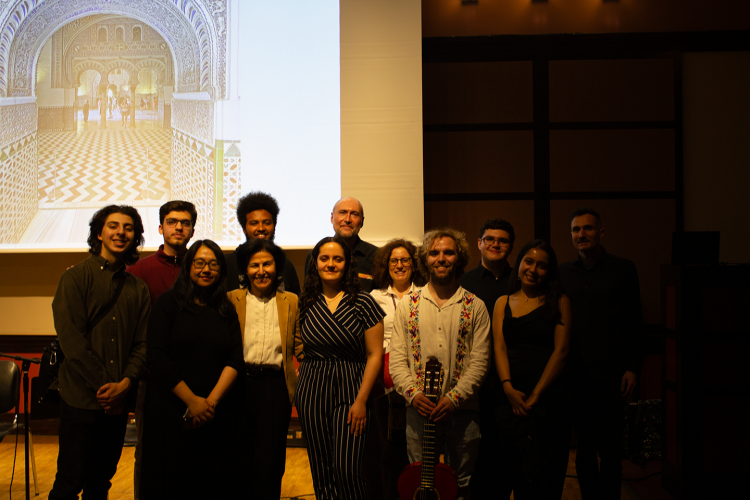
Arabic Language Lecturer Muna Bruce lower row the second from the left side, Music and Theater Arts Lecturer Garo Williams (top row middle) with student representative and event guests
- Dagmar Jaeger organizes the German Studies Writing prize. On April 29, 2025, the German Group and MIT-Germany hosted the German Studies Excellence Award 2025 ceremony, featuring Per Urlaub, Dagmar Jaeger, and Emily Goodling. The event celebrated outstanding student writing in German, recognizing excellence in language, analysis, and creativity. For more details, please read more on the full list of winners.
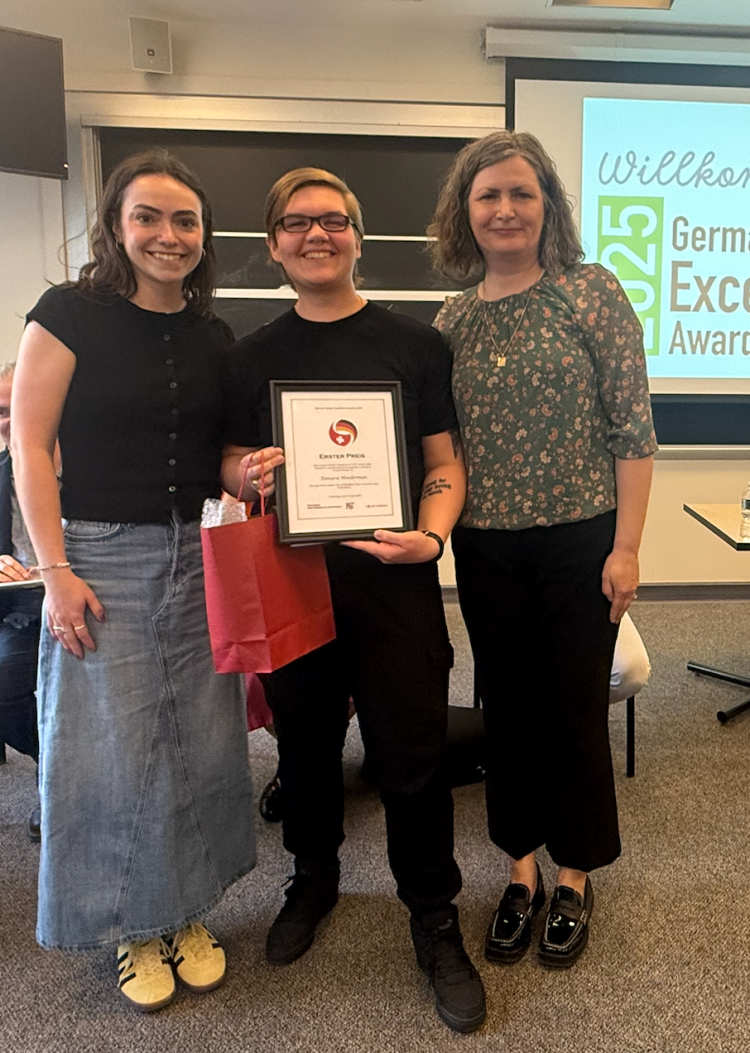
First Prize winner Tamara Hinderman ’25, with Abby MacKenzie, MIT Germany (left) and Dagmar Jaeger, Senior Lecturer in German, Global Languages
- Portuguese Language Lecturer Nilma Dominique organized a dynamic year of programming for the Portuguese program, which helped facilitate cultural and academic engagement. The program was honored to once again host the renowned musical trio Cia Armorial for a special performance, attended by members of the MIT community and a visiting delegation from Angola. Students deepened their cultural connections through the popular Batucada Brazilian percussion course, which offered hands-on musical expression, and enjoyed a screening of Walter Salles’ groundbreaking film I’m Still Here, the first Brazilian production to win an Academy Award. The year also marked the return of the Brazilian Student Association at MIT, celebrated with an early Festa Junina that brought the campus together for traditional food, music, and festivities, further enriching MIT’s appreciation of Lusophone cultures.
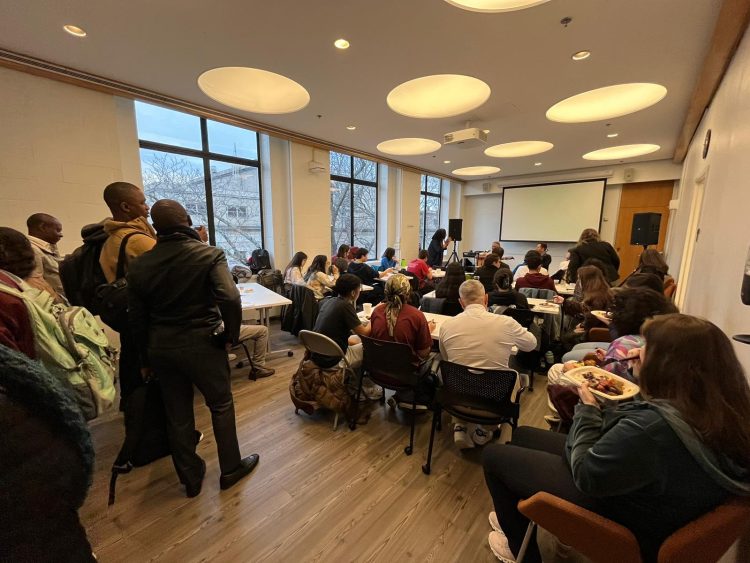
Cia Armorial
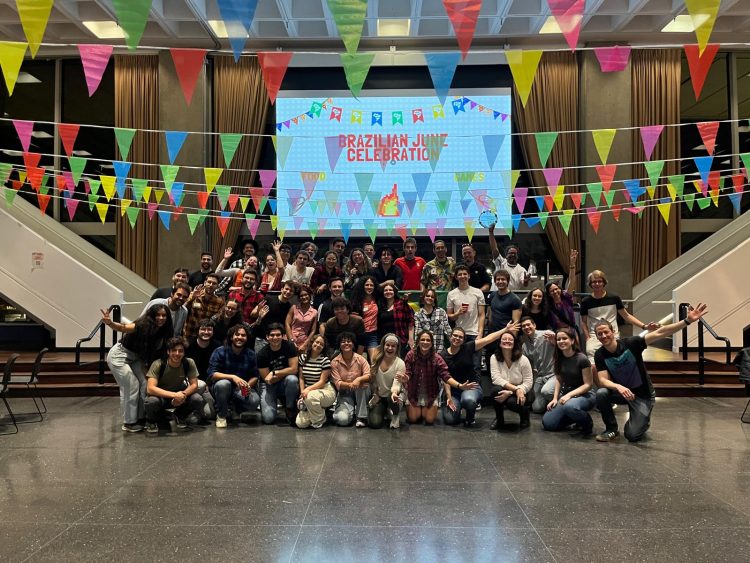
- Festa Junina
- Eva Dessein actively supported both departmental and campus-wide initiatives through academic and community engagement. On March 14, she collaborated with the African Learning Circle to organize a guest lecture by Dr. Convolbo. On April 3, she facilitated a student-alumni panel discussion, and on May 3, she served as a session facilitator at the CLTL Conference. Throughout the spring term, she also co-hosted the Pause-café French conversation table with colleagues Leanna Rezvani and Cathy Culot, fostering informal language practice and community-building among students.
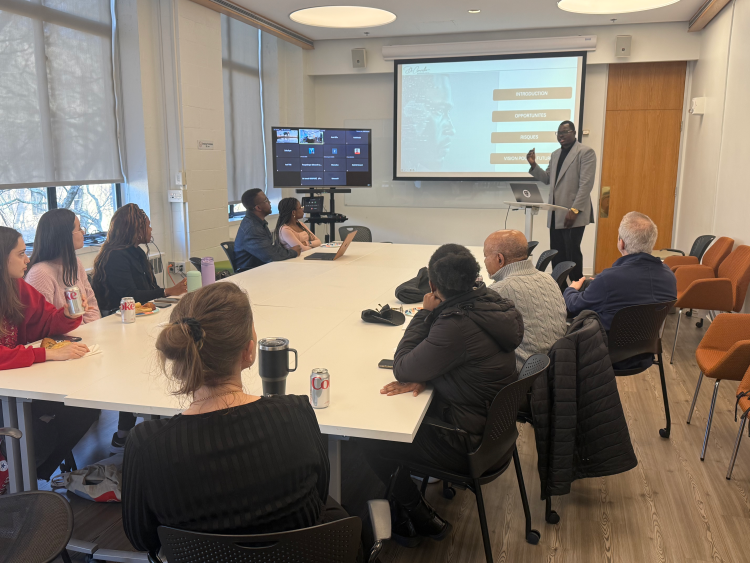
- African Learning Circle features Dr. Convolbo
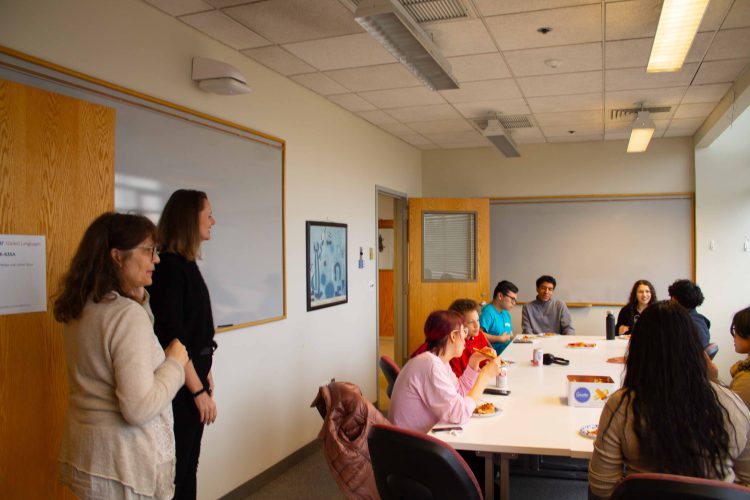
Cathy Culot(left) and Eva Dessein (Next to Cathy) and students in Pause Cafe
- Leanna Rezvani took her French I & II students and some of her JSF students to see the French musical, Contre-temps, at the Huntington Theatre on May 9th.
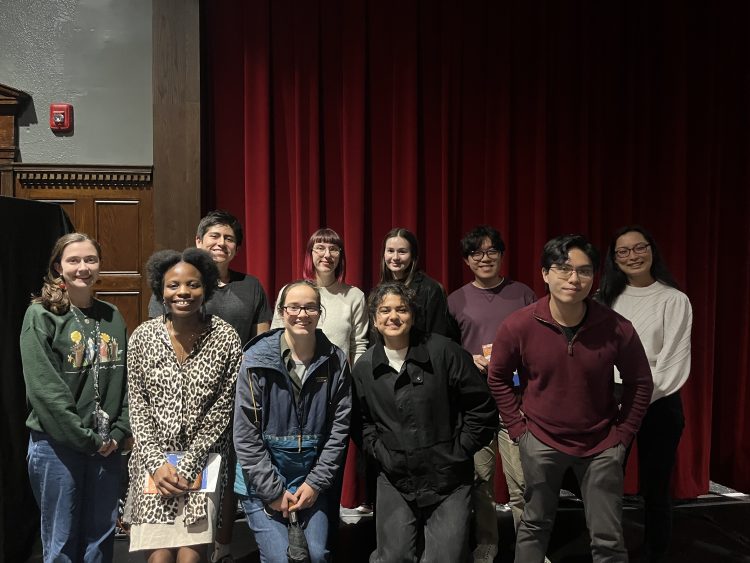
- Leanna Rezvani brought her student to see the French musical, Contre-temps, at the Huntington Theatre
- In November 2024, Min-Min Liang organized and collaborated with several GL colleagues on the “Heritage Meets Heritage” event.
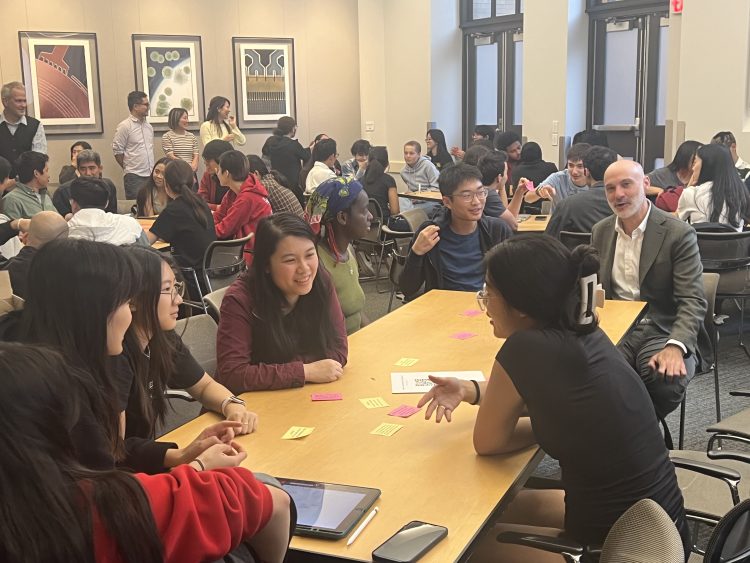
SHASS Dean Agustín Rayo attended the Heritage event
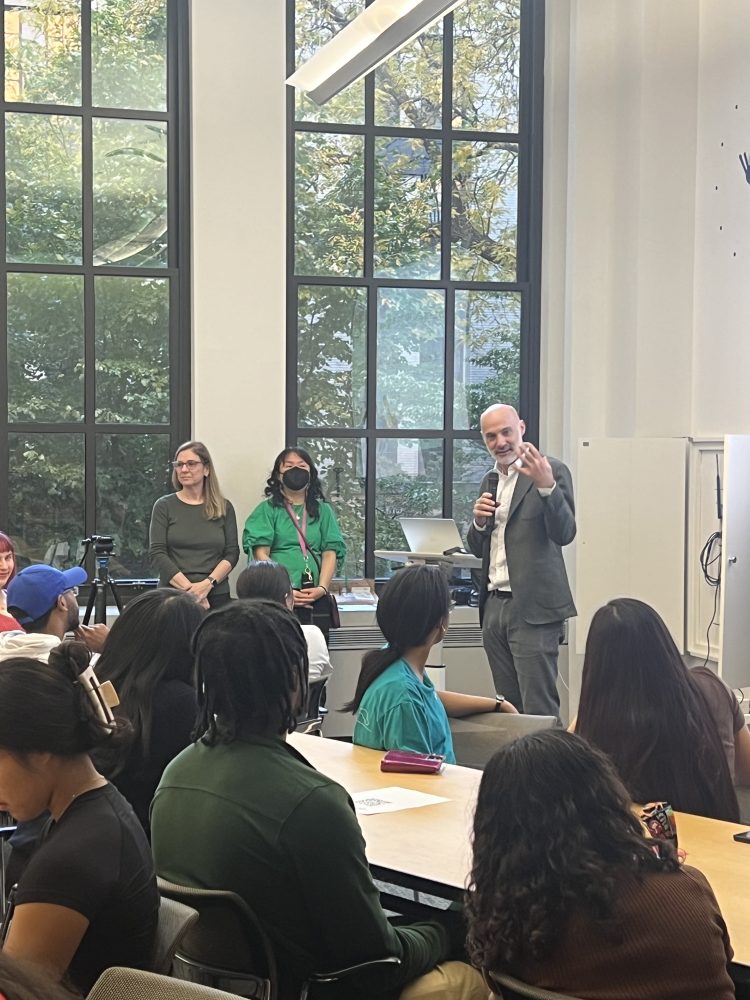
SHASS Dean Agustín Rayo gave un opening speech at the Heritage Event
- Per Urlaub actively advanced interdisciplinary initiatives at MIT through both academic programming and large-scale events. In May 2025, he co-organized The MITHIC Language/AI Incubator Colloquium with Leo Celi (Institute for Medical Engineering and Science), bringing together researchers from linguistics, AI, and healthcare to explore cutting-edge applications of language technology in medical and educational contexts. Read more. That same month, Urlaub led Mapping the Future: Language and Intercultural Education in an Age of Technological Disruption, a major conference hosted by MIT Global Languages. As lead organizer, he delivered the opening address and moderated two panels, facilitating critical dialogue among 185 registered attendees about the evolving role of language education amidst rapid technological change. The conference underscored Global Languages’ commitment to shaping inclusive, forward-looking pedagogies.
Honors and awards
- Cathy Culot, Hee-Jeong Jeong and Mark Römischhave been honored with the 2025 James A. and Ruth Levitan Teaching Award in MIT’s School of Humanities, Arts, and Social Sciences, recognizing their exceptional contributions to education.
- Nilma Dominique has been awarded the 2025 AOTP Excellence in Teaching Portuguese Prize, recognized as Higher Education Teacher of the Year by the American Organization of Teachers of Portuguese. This prestigious honor celebrates her innovative contributions to Portuguese language instruction, curriculum development, and mentorship within the Lusophone academic community. The award will be presented at the XIV EMEP World Conference on Portuguese Language Teaching at Duke University in August 2025.
- In May 2025, Muna Bruce was awarded a Canvas Innovation Fund grant to enhance instructional design in my Arabic language course. This summer, she will collaborate with an MIT undergraduate to develop new strategies for student engagement and course delivery. This project reflects her commitment to innovation and excellence in language pedagogy.
- Maria Khotimsky was the recipient of the 2024 ACTR (American Council of Teachers of Russian) Excellence in Teaching Award for Post Secondary Instructors.
- Kang Zhou and Panpan Gao have been award the 2025 Education Innovation Fund to support their project, Enhancing Language and Cultural Competence through AI-Generated Sociocultural Scenarios.
- Takako Aikawa leads Fluid Language Pedagogy (FlaP), an innovative initiative supported by the MIT SHASS Education Innovation Fund. This project reimagines language learning through adaptive, technology-enhanced frameworks, blending cutting-edge pedagogy with tools like AI to create personalized, student-centered instruction. FlaP bridges traditional language education and emerging technologies, fostering dynamic teaching methods that respond to diverse learner needs in multilingual classrooms. By prioritizing flexibility and interdisciplinary collaboration, the project advances MIT’s mission to transform global communication through scalable, humanistic approaches to language acquisition.
- Per Urlaub (Global Languages, MIT) and Leo Anthony Celi (Institute for Medical Engineering and Science, MIT) co-lead the Language/AI Incubator, an interdisciplinary initiative supported by the MIT SHASS+ Connectivity Fund. This project bridges language studies, AI, and medical engineering to explore innovative applications of language technology in global health, education, and cross-cultural communication. The incubator fosters collaboration between MIT’s School of Humanities, Arts, and Social Sciences (SHASS) and scientific/technical disciplines, leveraging AI to address real-world challenges in multilingual and medical contexts.
In and out of the classroom
- Kang Zhou saw two students from his 21G.111 Chinese Calligraphy course selected for international recognition. Xinyan Pan and Alex Li, both MIT seniors, had their calligraphy works chosen for exhibition at the 14th International Conference on Hanzi Shufa Education (August 9-10, 2025). Pan created an original letter in classical Chinese, while Li produced a piece featuring a Tang poem. Their works will be showcased online by the American Society for Shufa Calligraphy Education.
- Eva Dessein brought French culture to life through experiential learning in her courses. During a culinary unit in French 316, her students visited the authentic French bistro Batifol, where many tried classic dishes like coq au vin for the first time. The most adventurous even conquered their initial hesitation to taste escargots, discovering the surprising delicacy of French-style snails.
- Students of Dagmar Jaeger’s 21G.420 German Cinema met filmmaker Ilker Catak at the Goethe Institute on Feb 3, 2025, during his talk about his latest feature film “Das Lehrerzimmer”. They also participated in an online talk & discussion session with Ilker Catak on Feb 6, entitled “Freedom vs. Safety: Choosing a Career in the Arts”, organized by the Center of German and European Studies, Brandeis University.
- On March 19, 2025, Masami Ikeda and Wakana Maekawa delivered a presentation titled “Integrating In-Person and Asynchronous Learning: A New Hybrid Model for Japanese I–IV” at the Global Languages Spring Colloquium. They introduced a newly developed hybrid course design and discussed the pedagogical framework, cross-level collaboration, and findings from student feedback and learning outcomes.
- In April, Maria Khotimsky was one of the co-organizers of the New England College Olympiada of Spoken Russian, hosted at the Davis Center at Harvard on Sunday, April 6th. MIT sophomore Lance Berkey took First Prize in the Second-Year Poetry Recitation contest, and first-year student Adriana Torres Li Ning received an Honorable Mention in the Speech Contest.
Publications
- Nilma Dominique co-edited and contributed to the inaugural special issue of the Portuguese Language Journal, titled “Voices of Leadership: Women in Portuguese Language Programs in U.S. Higher Education.” This landmark issue highlights the contributions of women educators in the field. Access the full publication here: Portuguese Language Journal.
- Teaching Russian Through STEM: Contexts, Tools, and Approaches, co-edited by Maria Khotimsky and Svetlana V. Nuss (New York: Routledge). Khotimsky contributed to several chapters in this publication, including “Designing Content-Based Modules for Teaching Advanced Russian,” first author, co-authored with Svetlana Abramova and Veronika Egorova (pp. 78-101); “History and Modern Practices of Integrating STEM in the Teaching of Russian as a New or Heritage Language,” first author, co-authored with Svetlana V. Nuss (pp. 3-24); and “Pedagogy of eaching Russian through STEM in the 21st Century,” co-authored with Svetlana Nuss (pp. 233-257). Link to publication.Additionally, the volume Contemporary Translation in Transition: Poems, Theories, Conversations that Khotimsky co-edited with Friederike Reentz, Henrieke Stahl, and William Waters (Boston: Academic Studies Press, 2024), is now available in open access, thanks to the MIT Libraries Open Access Publishing Grant. Link to the pubication.
- Leanna Rezvani’s monograph, Hagiography in Marguerite de Navarre’s Heptaméron: Saints and Debates in Renaissance France, (University of Delaware Press) is now available for purchase. Link to the publication.
- Haohsiang Liao published a peer-reviewed article in December, “Mobilizing Engagement in Designing and Implementing Global Chinese Language MOOCs,” in The World of Chinese Language, Volume 132: 27-42.
- Per Urlaub and Eva Dessein published in March “When Disruptive Innovations Drive Educational Transformation: Literacy, Pocket Calculator, Google Translate, ChatGPT” in An MIT Exploration of Generative AI. They also co-authored “Kasparov, Vygotsky, and ChatGPT: What a Chess Prodigy and Child Psychologist Can Teach Us about AI in Education” in FLTMAG, an online magazine on technology integration in language teaching and learning.
- Leanna Rezvani published a chapter entitled “Innovation, Internships, and Inclusion: Strategies for a Successful French Program at MIT” in the International Handbook of French Education.
- Per Urlaub published “Vygotsky meets ChatGPT” in MIT Open Learning Blog in February. His co-authored chapter “Deutsch als Fach- und Fremdsprache in den USA” appears in the upcoming open-source publication Handbuch Deutsch als Fach- und Fremdsprache edited by Szurawitzki and Wolf-Farré.
In the news
- Takako Aikawa was featured in an MIT News article on the Festival of Learning in April: “MIT faculty, instructors, students experiment with generative AI in teaching and learning.“
- MIT News highlighted GL’s IAP Quechua class and its instructor, Soledad Chango, in “Investigating and preserving Quechua.“
- Nilma Dominique was interviewed in April by the Brazilian Newsletter Valor Econômico Pipeline.
- Emily Goodling was profiled in an article published in MIT News: “3 Questions: Why study theater in a German language class?“
- Kang Zhou was interviewed by The Tech “A Passion for Teaching Chinese” in March.
Conferences, presentations, meetings
- Dagmar Jaeger presented a paper entitled “Social Reading and Digital Literacy” and served as session organizer for “Social Annotation in L2 Reading and Writing” at the NeMLA Conference on March 6, 2025. She also received Dean’s Grant funding to participate in workshops on writing and AI at the CALICO Conference in San Diego in May 2025.
- Haohsiang Liao gave an invited talk, entitled “Three Years of Study Abroad Programs in Taiwan,” at the Chinese Language Center of National Sun Yat-sen University in January.
- Nilma Dominique served for the second consecutive year as an advisor for the Brazil Conference 2025, a flagship event co-hosted by Harvard University and MIT, where she also contributed as a panelist in two discussions. Additionally, in partnership with the Cultural Department of the Consulate of Brazil in Boston, she helped organize a two-day series of Portuguese language workshops, providing heritage language education training and professional development for local Portuguese instructors.
- In 2024 and 2025, Min-min Liang actively contributed to the field of heritage language education through presentations, panels, and organizational leadership. In October 2024, she presented “Community Building: Heritage Meets Heritage Event” at the New England Chinese Language Teachers Association Annual Conference (Tufts University) and co-organized the ACTFL Heritage Languages Business Meeting. Later that November, she delivered the paper “Diversity as Opportunity: Cross-Linguistic Experiences in Heritage Learners” at the ACTFL Annual Meeting in Philadelphia. In January 2025, she was an invited virtual speaker at the University of Toronto’s Department of East Asian Studies, discussing “Focusing on Chinese Heritage Learners: How to Develop and Adopt Teaching and Learning Materials for Them.”Her engagements continued in March 2025 with the presentation “Digital Story: Improving Literacy for Chinese Heritage Language Learners” as part of the panel “Social Annotation in L2 Reading and Writing” at the Northeast Modern Language Association Annual Meeting (Philadelphia). In May 2025, she presented twice at the Chinese Language Teacher Association Conference in NYC: first on “Exploring Identity through Project-based Language Learning for Heritage Learners” and then on “Maximizing Language Gains for Heritage Learners of Chinese: Exploring Course Models and Overcoming Challenges,” highlighting pedagogical innovations for heritage language education.
- In February, Maria Khotimsky attended AATSEEL (American Association of Teachers of Slavic and East European Languages), held virtually. She served as a panel chair for the panel on “Poetry and Translation I: Russian Verse Translation,” contributed as a panel discussant for “Poetry and Translation II: Identity in Translation (Polish, Qazaq, Russian, and B/C/M/S),” and served as the organizer and chair of “Connecting the Teaching of Russian with Professional Domains Beyond the Humanities.” On March 26, 2025, she gave a guest lecture “Writing Across Languages: Translation and Translingual Poetry of Post-Soviet Literary Diaspora” at Wheaton College. On May 16, 2025, she took part in the ACTR Roundtable on Open-Access Resources, presenting on “Choose to Study Russian for Professional Needs” resource and its pedagogical applications.
- Panpan Gao delivered several invited talks and presentations throughout 2024 and 2025. In December 2024, she gave an invited talk titled “Practical and Effective Application of ICLE Standards in Teaching and Assessment of the News and Documentary Unit in Chinese Language Courses” at the NECLTA Workshop in virtual.In May 2025, she presented three times: first, an invited talk “Program Planning and Curriculum Design at Middlebury Chinese School: Bridging Language Instruction and Cultural Engagement” at the Chinese Flagship Summer Program, University of Rhode Island, Kingston, RI; next, a panel presentation “Maximizing Language Gains for Heritage Learners of Chinese: Exploring Course Models and Overcoming Challenges” at the CLTA Annual Conference in New York; and finally, a paper “Autonomous Learning for Cultural Engagement in Intermediate-Advanced Chinese Heritage Classes: Curriculum Design, Activity Planning, and Assessment Adjustments”, also presented at the CLTA Annual Conference in New York.
- Kang Zhou presented research at multiple conferences throughout the 2024–2025 academic year. In October 2024, he delivered the paper “Tone and Intonation Training Strategies in Elementary Chinese Course” at the 13th NECLTA Conference, Tufts University.In March 2025, he presented “The Application of Perusall in Advanced Chinese Language Teaching” as a paper at the NeMLA Annual Convention in Philadelphia, PA. The following month, he gave an invited talk titled “The Art of Chinese Calligraphy: From Ancient Strokes to Modern Expressions”, hosted by the Chinese Program, Department of Asian Studies at Bowdoin College.In May 2025, he presented two papers at the CLTA Annual Conference in New York: “Maximizing Language Gains for Heritage Learners of Chinese: Exploring Course Models and Overcoming Challenges” and “Project-Based Language Learning and Its Implementation in Chinese Classrooms”.
- In March 2025, Eva Dessein co-delivered the keynote “Is Liberal Arts Education Compatible with Generative AI?” with Per Urlaub at Colby College, Maine, addressing the challenges and opportunities of AI integration in humanities education.
In June 2025, she presented “From Resistance to Embrace: A Framework for Understanding Technology Adoption in Language Education” with Per Urlaub at the APLIUT Congress in Colmar, France, contributing to international discussions on technology’s role in language teaching. Her ongoing telecollaborative project with ParisTech and ENAM continues to connect students in France and the U.S., facilitating multilingual interaction and intercultural learning for intermediate-level French learners.
-
Min-Min Liang presented “Curriculum Design for Chinese Heritage Language Beginning Level Course” as a (virtual) invited speaker in January for The Foundation for Scholarly Exchange (Fulbright Taiwan) organized by U.S.-Taiwan Education Initiative. In April she presented at the 2024 Annual Chinese Language Teacher Association Conference in St. Louis: “Empowering Heritage Language Learners through Innovative Approach and Resource Development,” as well as, “Project Design for Chinese Heritage Language Beginners: A Chinese Tour guide.” In May she presented “Mapping the Terrain: Evaluating and Envisioning Chinese Language Textbooks for Chinese Heritage Learners in the U.S.” at 2nd Heritage Languages Around The World conference at UMass Amherst.
- In November 2024, Muna Bruce presented at the American Council on the Teaching of Foreign Languages (ACTFL) Convention as part of the panel “Diversity as Opportunity: Cross-Linguistic Experiences in Heritage Learners.” Her presentation focused on the role of dialectal diversity in Arabic heritage language instruction, exploring its implications for curriculum design, classroom dynamics, and student identity. Muna emphasized the importance of incorporating dialectal variation to foster more inclusive and authentic learning environments.
- Per Urlaub delivered presentations on language education and AI at multiple conferences in spring 2025. In March, he presented “Dear ChatGPT! Do My Language Courses Still Matter in the Age of AI?” remotely to Ursinus College, Pennsylvania, framing AI as both a challenge and catalyst for reimagining language education.
In April, he gave three talks:
-
“Lost in Translation: The Art and Craft of Translation in the Age of Artificial Intelligence” at Colby College, Maine, exploring AI’s impact on translation pedagogy.
-
The co-delivered keynote “Is Liberal Arts Education Compatible with Generative AI?” (with Eva Dessein) at Colby College.
-
A remote presentation “Post-Disciplinary Teaching in the Age of AI” at Purdue University, Indiana, advocating for collaborative curriculum design.
In June, he presented “From Resistance to Embrace: A Framework for Understanding Technology Adoption in Language Education” (with Dessein) at the APLIUT Congress in Colmar, France. Later that month, he delivered “The MITHIC Language/AI Incubator” as an invited remote presentation to KAIST, South Korea, highlighting MIT’s interdisciplinary work in AI and language studies.
-
Lecturers in the News Elsewhere
- Tong Chen was interviewed by Middlebury College in honor of 25 years at the Chinese School, celebrated on May 19, 2025. Full article Link.
- Min-min Liang was interviewed by MIT SHASS for their Community Spotlight series, discussing her innovative teaching approaches in Chinese language education. Watch the full interview.
- Mark Römisch’s long-term project, “Bauhaus New England,” is on display in the Importing Bauhaus exhibition at ArtsWestchester (White Plains, NY) in May, supported by a 2025 Mass Cultural Council Grant. Focused on rarely seen private Bauhaus homes, the photographs explore the transatlantic legacy of modernist design and will culminate in a 2026 book with Hatje Cantz.
Global Languages Pet Parent Association
Emily Goodling & Gerald
Though Gerald technically isn’t Emily’s cat (he belongs to her landlord), this fluffy charmer has claimed her Cambridgeport apartment as his second home. You’ll often find him lounging like a tiny, furry landlord himself—supervising from sunbeams and demanding occasional tribute in the form of pets.
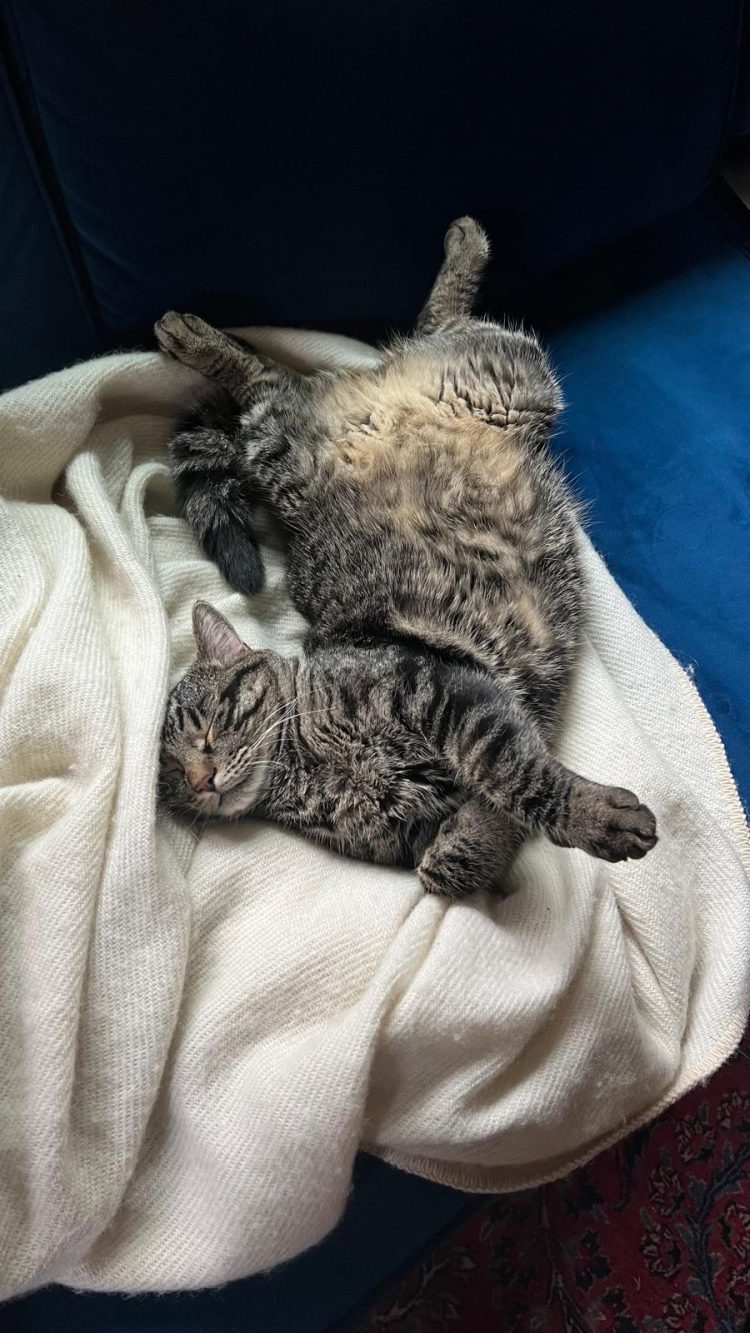
Leanna Rezvani & Fidalgo
Meet Fidalgo, the wise old beagle who just celebrated his 15th birthday! This sweet senior has spent over a decade being the best good boy—sniffing out snacks, howling at squirrels, and proving that age is just a number when you’re living your best beagle life.

Weiwei Pearl & Cosmo & Nebula
Weiwei is the proud human of two feline siblings: Cosmo, the fierce black cat hunter who proudly brings “gifts” (sometimes too real for comfort), and Nebula, the tappy, snuffly sweetheart whose nasal noises make her an adorably ineffective predator. Together, they’re a perfect pair—one rules the backyard, the other rules the couch.
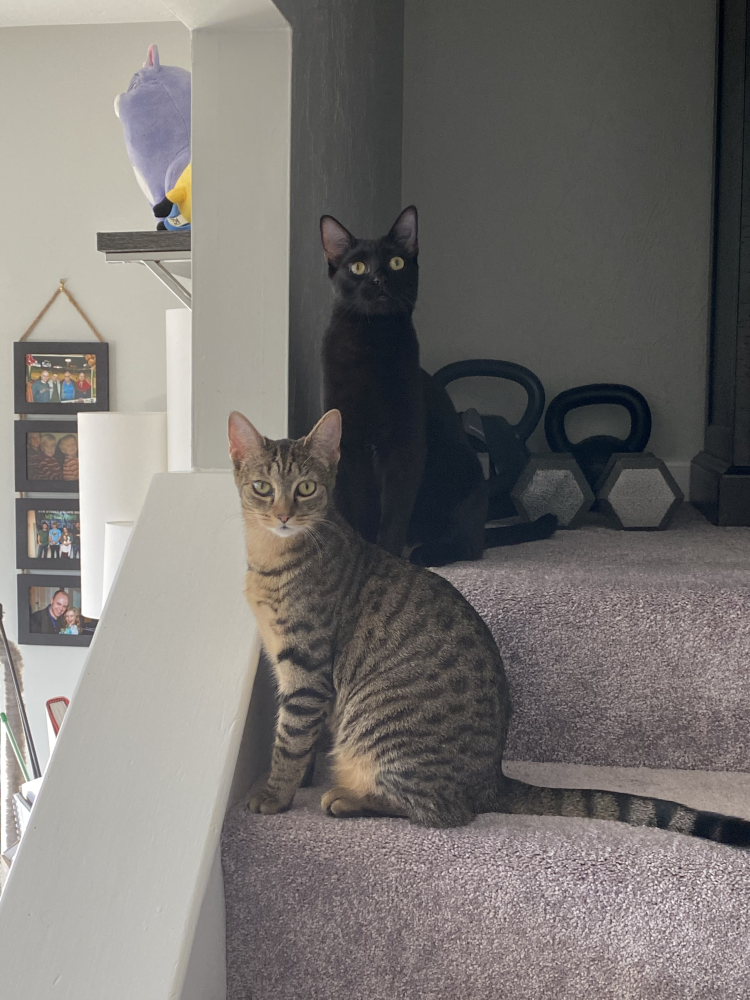
Eva Dessein & Blixa
Meet Blixa, Eva and Per’s 9-year-old dachshund. Named after Blixa Bargeld, she sadly was never part of a Bad Seeds tour, but she enjoys a cushy life, with her two loyal butlers. Her favorite things include eggs, tomatoes, and the ding of the air fryer. Her little legs may be short, but she plays a mean game of ball when she is not too busy napping. Though politely reserved around other dogs, she wins humans over instantly, especially if there are treats!
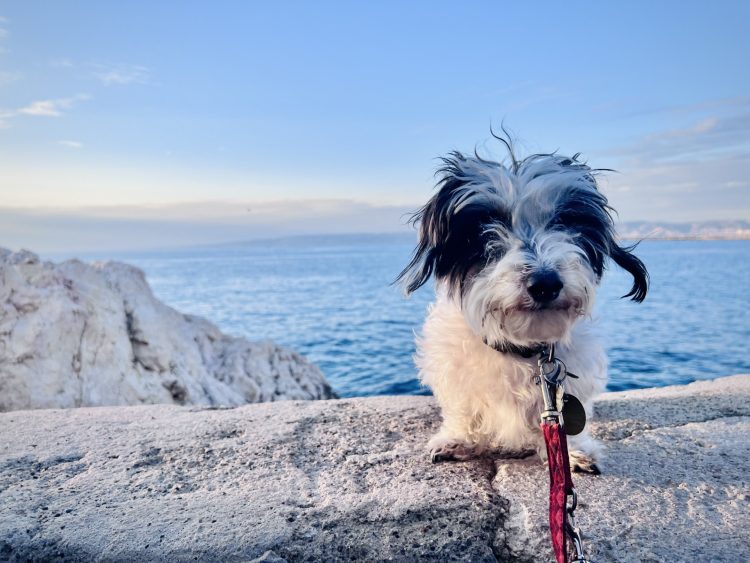
Wakana Maekawa & Sumomo, Momota, and Kiki
Sumomo and Momota, a mother-and-son duo, are the mascot dogs of the dog grooming salon run by Wakana’s mother in Japan. Momota loves other dogs and quickly makes furry friends, while Sumomo, a people-and-snack lover, charms all the humans. Together, they make a great team. Last year, a cat named Kiki joined the family. Now the three of them line up, offer their best paws, and enjoy their meals—just like the adorable trio they are.
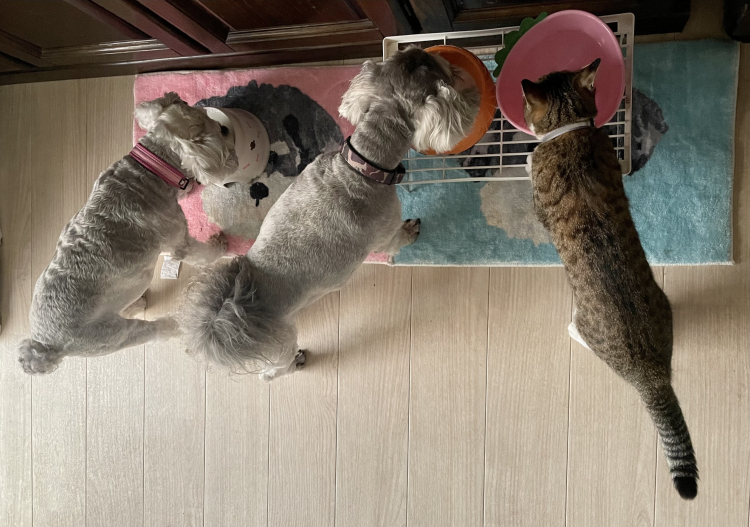
Masami Lamm & Kuma
Kuma (“Bear in Japanese) is a 13 1/2-year-old yellow lab. As a puppy, he looked just like a teddy bear, and completely overturned Masami’s long-standing resistance to having a dog. After years of wildness and mischief, he now enjoys very slow walks and peaceful naps, and fills our empty nest with warmth and the occasional loud snore.

Paula Cogliano & Dorothy
We all know Dorothy from her brief time “working” with Paula in HQ. Dorothy will be turning 10 in August and has now fully retired. She spends her days watching over the garden and napping in the air-conditioning. She misses seeing everyone but is happy to avoid the commute.

Joseph Borkowski & Lulu
Born before the original iPhone and adopted in 2012, Lulu has lived through much of modern history and now prefers to sleep all day in one of five specific locations throughout Joe’s home. When awake, she purrs loudly and meows a response when welcomed into the room. She has a fondness for human whistling, spiderwebs, attempting to climb onto the roof, eating, and reminding humans to go to bed. Formerly a fan of chasing down televised tennis balls, laser pointers, and the birds she saw through the windows, Lulu now moves at a leisurely pace but has begun to tolerate belly rubs!
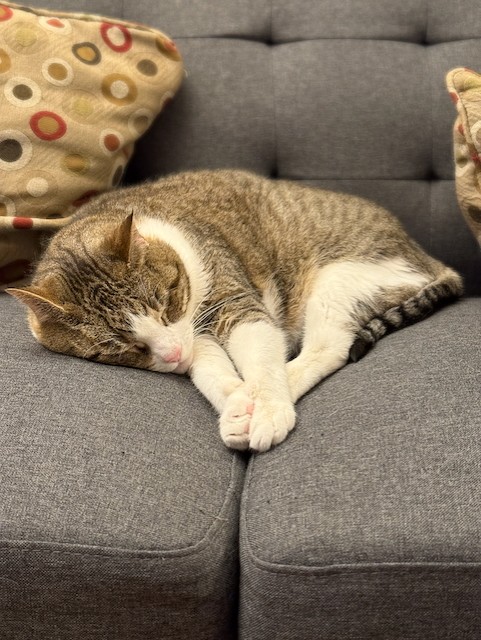
Javier Barroso & Zeze & Buddy
Rescued from tough beginnings—Buddy from a Texas breeder’s cage and Zeze from a hoarder’s chaotic home—these chihuahua mixes now thrive under Javier and Erinn’s care. Tiny but mighty 5-year-old Buddy, once timid with weak legs from confinement, has blossomed into a beach-loving treat enthusiast, while 9-year-old Zeze, the smartest (and most overprotective) pup in the house, traded her wild ways for endless family cuddles (though she still side-eyes strangers). Together, they’re proof that love and patience can rewrite even the hardest pasts.
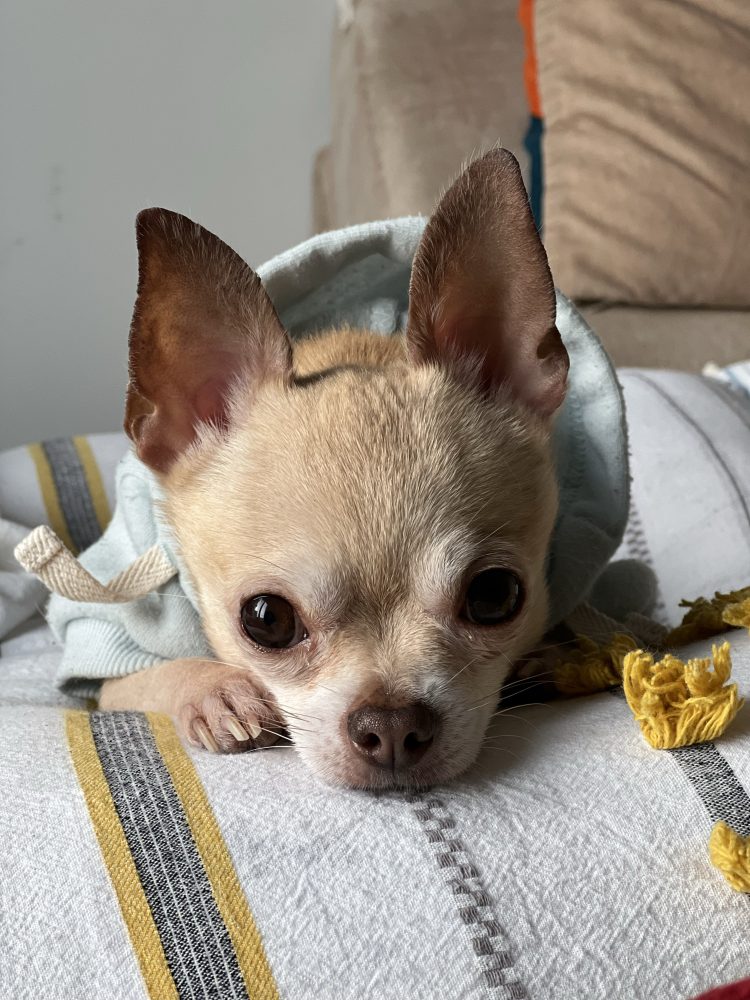

Muna Bruce & Bo
Bobo is a 13-year-old Goldendoodle with a wagging tail, a soft smile, and a heart full of charm. Adopted at age 4, he’s been spreading joy ever since — greeting every person and pup with kindness and curiosity. On his walks, he’s always busy sniffing the world and has a soft spot for French fries, cucumbers, and the occasional banana. Whether bravely facing a black bear on a forest trail in NE or meeting his sarcoma journey with quiet strength, Bobo’s spirit never wavers. It’s no exaggeration to say his gentle courage and steady joy have been truly inspiring. Even now, he hasn’t lost the sparkle in his eyes — or his playful energy that never fades.
